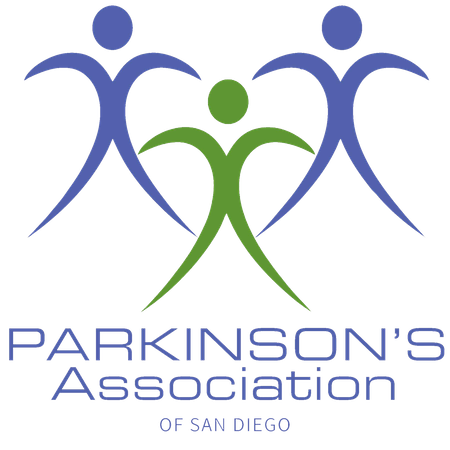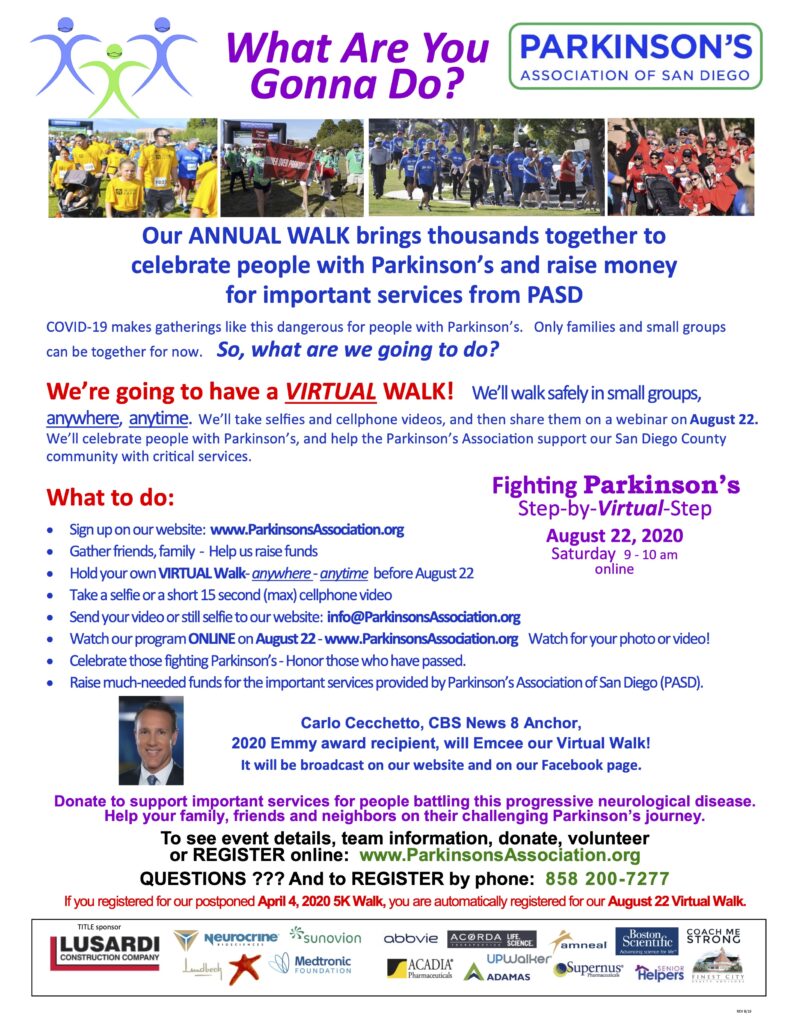Eating with Parkinson’s, Article by Marty Acevedo, MS
Eating with Parkinson’s
An Article About Diet and Nutrition by Marty Acevedo, MS, RDN
When diagnosed with Parkinson’s disease, it’s probably normal and quite common to look for causes of our diagnosis and, then, to look for ways to treat, “cure”, or manage symptoms. A quick online search will reveal many “quick fixes” and claims of cure through modification of our diets or intake of various supplements. However, research and science has yet to prove there is a “diet” for Parkinson’s disease and Parkinsonism. Even so, there is some evidence to suggest modifications and inclusion of specific foods can be helpful for those of us with PD.
Generally, most experts recommend a Mediterranean lifestyle for not only people with PD, but also for most everyone. So – what does that mean? There is research that supports the concept that a Mediterranean diet may be neuroprotective and may slow progression of the disease.
Ask your physician for a nutrition consult/referral with a Registered Dietitian/Nutritionist (RD or RDN). This health care professional has at least a BS in nutrition, followed by a comprehensive internship. An RD/RDN must pass a complex registration examination and maintain competency with continuing education related to their field. Registered Dietitians/Nutritionists are nutrition experts and can assist with identifying and offering tools, resources and education.
A Mediterranean diet consists of
- Increased intake of fish and seafood, with decreased consumption of red meats and poultryUtilize fish and seafood at least twice per week
- Use of olive oil instead of other oils and fats, although canola oil can be substituted
- Turmeric – spice, often found in mustard and in curry and has anti-inflammatory properties; are phytochemicals; may be neuroprotective
- Rosemary – a phytochemical and may be neuroprotective
- Focus on Fruits and Vegetables – good sources of phytochemicals, antioxidants, carotenoids and beta carotene, good source of B vitamins and vitamin C, vitamin A
- Multigrain breads and cereals – fiber, good source of B vitamins
- Nuts are a great source of vitamins/minerals and omega 3 fatty acids
- Red wine in moderation and with meals (only if approved by a physician).Appears to be neuroprotective.
What are phytochemicals and antioxidants? These are substances naturally found in fruits, vegetables and some spices that help our body’s cells to work more efficiently; they work to capture toxins (free radicals) that disrupt the work of the cells. Foods that have strong antioxidant properties include:
- Berries
- Cranberries
- Pomegranate
- Grapes
- Yellow and dark green leafy vegetables
- Red wine
- Dark Chocolate
- Green tea
- Foods containing higher levels of omega-3 fatty acids, such as salmon, halibut, herring, mackerel, sardines, tuna and nuts
Exercise is a key component of a Mediterranean lifestyle. At least 2.5 hours of exercise per week is recommended – that’s about 30 minutes/day for everyone. Exercise is even more important for people with PD. It’s the only therapy that’s been proven to slow progression of PD. Daily exercise can improve fitness levels, improve balance, strengthen muscles (and potentially reduce fall risk), improve mobility, improve mood and improve cognition. Varied exercise is best so mix it up with walks, cycling, classes, boxing, yoga, Pilates, swimming, etc.
Other Considerations:
Keto diets or paleo diets have been popularized as weight management/weight loss plans. One study that included five people who followed the diet for 28 days showed improvement in PD symptoms; however, a placebo effect could not be ruled out. This type of diet is highly restrictive – very high fat, high protein and minimal/no carbohydrates. The diet may be neuroprotective and may reduce presence of and impact of alpha synuclein in the brain. However, it’s incredibly difficult to comply with the restrictions; the diet is deficient in B vitamins, vitamin C, fiber, and some minerals. Symptoms of constipation and/or diarrhea can worsen. Since a keto diet is designed to cause ketosis, long term use may affect kidney and liver function.
Vitamin and Minerals
- B vitamins (thiamin, riboflavin, niacin, pantothenic acid, pyridoxine, biotin and cyanocobalamin) are necessary for metabolism, healthy nervous system.
- B6 (pyridoxine) may reduce the risk of developing PD.However, mega doses of B6 (greater than 50 mg) can reduce the absorption of levodopa.
- Vitamins A, C and E are antioxidantsVitamin C may be neuroprotective, but over-supplementing is dangerous. Data on vitamin E is inconclusive; vitamins A & E are fat soluble and can cause harm if taken in excess
- Serum levels of Vitamin D may be lower in PwP.Calcium and vitamin D are important for bone health Check with your doctor to determine the need to supplement (if osteopenia or osteoporosis is confirmed and/or if serum vitamin D levels are low.
- Vitamins work synergistically so it’s best to obtain from the foods that we eat.
- A good & reputable multiple vitamin with minerals (to include calcium) is sufficient. Supplementation with individual vitamins can be hazardous, may not be useful, and can be expensive. Supplements are not regulated and may not be what they appear to be.
Other Neuroprotective Foods/Other Considerations
Caffeine appears to be neuroprotective in men and postmenopausal women. Tea may be neuroprotective and may delay onset of symptoms. Soy contains genistein, which has proven to be neuroprotective in rats (more research needed). Fava beans are a natural source of dopamine (levodopa), but the concentration, quality, and availability is inconsistent.
Parkinson’s Medications and Food
Protein and Carbidopa-Levodopa
- Levodopa competes with dietary protein for absorption
- However, 30% of PwP have no interaction between levodopa and protein
- Some physicians advise to avoid taking dose of Carbidopa-Levodopa with high protein meals
- Take on an empty stomach 30 to 60 minutes prior to meal or 60 minutes after a meal
- May need a carbohydrate containing snack with dose to reduce nausea
MAOI-B Inhibitors
- Generally, no interaction between these medications and food
- However, MAO-B inhibitors contain tyramine and, in rare cases, may cause potentially dangerous hypertension when taken with these fermented meats, red wine, and tap beerSelective MAOI –B inhibitors (like those prescribed for Parkinsons) do not generally interact with foods; you would need to eat a wheel of brie with a case of red wine to run the risk of an interaction.
- Pharmacists may suggest that these medications, (i.e. Azilect, Selegiline, for example) may interact with certain foods.However, these are selective MAOI-inhibitors and, unlike other medications that are non-selective MAOI-inhibitors, there is little to no risk of a drug-food interaction
Symptoms of PD that Affect Nutrition Intake and Status
- Hyposmia – loss of smell; usually precedes other symptoms
- Ageusia – loss of sense of taste. Can lead to weight loss, depression, malnutrition
- Constipation – common in PD. Increase fiber (whole grains, fruits/vegetables, supplemental fiber), maintain hydration, Exercise!!
- Irritable Bowel Syndrome – 70% of those with PD have IBS-C (constipation) but 25% have IBS-D (diarrhea). Mediterranean diet is helpful; limit dairy if lactose intolerant. Limit high fat and highly processed foods. Utilize mindfulness and EXERCISE!!
- Nausea – may be side effect of medications; talk to neurologist. Small frequent meals, ginger, peppermint tea may help to resolve symptoms.
Weight Management and Malnutrition
As many as 30% of people with mild or moderate Parkinson’s disease are at risk for malnutrition, due to a multitude of factors:
- decreased appetite related to depression, constipation, nausea, apathy
- tremor may increase calorie requirements and/or inhibit ability to eat adequately
- dyskinesia can increase calorie requirements and make meals difficult to eat
- dysphagia – difficulty swallowing – usually causes decreased intake
Strategies to increase nutrient intake include small frequent meals, snacks, supplements, easy-to-eat foods, flavorful foods, add sauces and gravies
Weight Gain
- Can occur with use of certain medications: dopamine agonists, etc., antidepressants
- Common after DBS surgery. Thought to be related to decreased energy expenditure with reduction in tremor and dyskinesias. Weight gain up to 20# is common.
- Utilize moderation in intake; if weight loss or maintenance is desired, limit portion sizes and limit high calorie foods.
- Exercise, exercise, exercise!!
Dysphagia (difficulty swallowing)
- Caused by rigidity, weakness, bradykinesia (slowness of movement) – all related to Parkinson’s disease
- Ask for a consult with a Speech & Language Pathologist (Speech Therapist)
- Be proactive – strengthen vocal cords before there’s an issue: Tremble Clefs, LSVT-LOUD, Speak Out (Parkinson’s Voice Project)
- May require modification of food consistencies – pureed foods, no mixed foods, thickened liquids
- May require enteral (tube) feedings if severe. Placement of a gastrostomy tube is an option.
- Risks of dysphagia, if untreated, include weight loss, malnutrition, and aspiration pneumonia
This overview is just that: a summary of suggestions/recommendations for nutrition and diet related to Parkinson’s disease. Remember that it’s best to obtain your nutrients from food; add a multivitamin/mineral supplement that is age appropriate if you feel your diet is not balanced. Supplementation with specific vitamins/minerals is recommended only when a documented deficiency is found. There are no “bad” foods,but use moderation in all things.

